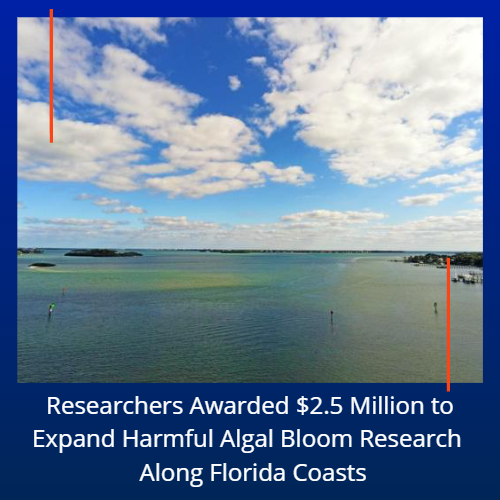Researchers Awarded $2.5 Million to Expand Harmful Algal Bloom Research
Along Florida Coasts
A team of 11 professional researchers and scientists from the University of South Florida (USF), University of Florida (UF), and South Florida Water Management District (SFWMD) were awarded a $2.5 million grant from the U.S. Army Corps of Engineers to support the development of new state-of-the-art water quality data and models to better predict and manage harmful algal blooms (HABs) in Lake Okeechobee and the St. Lucie and Caloosahatchee River watersheds.
The three-year grant will fund a new decision support system that will allow end-users to rapidly interpret short term forecasts, predict future HABs, and deliver crucial information and tools.
HABs occur when rapid growth of algae leads to an accumulation of individual cells that, in turn, discolor water, often produce floating mats that produce unpleasant odors, and may negatively impact fish, birds and other animals.
The research team will take a multidisciplinary approach to fill any knowledge gaps by utilizing water resources modeling, water quality monitoring, physical oceanography, stakeholder engagement, and HAB source tracking, characterization, and prediction.
“The goals of this project are to generate actionable knowledge and develop a tool that will allow managers to better predict and manage HABs in Lake Okeechobee and the St. Lucie and Caloosahatchee River watersheds,” said Wendy Graham, director of the UF Water Institute, a campus-wide interdisciplinary institute that brings scientists and stakeholders together to understand and solve complex water challenges.
“With collaborative interdisciplinary expertise and strategic actions that targets HABs on multiple fronts, this team will advance the knowledge and tools surrounding these blooms, furthering a future of cleaner waters for the state of Florida,” said David Kaplan, director of the Howard T. Odum Center for Wetlands and associate director of the UF Center for Coastal Solutions.
“HABs cause many negative environmental, health, and economic effects throughout the state” said Mauricio Arias, assistant professor at the USF Department of Civil and Environmental Engineering and principal investigator for the project. “This three-year grant from the U.S. Army Corps of Engineers supports the development of new state-of-the-art water quality data and models to better predict and manage HABs in this vitally important and environmentally sensitive ecosystem.”
“Improving water quality and addressing harmful algal blooms remains a top priority for the South Florida Water Management District,” said Cassondra Armstrong, Section Administrator of the Coastal Ecosystems Section at the South Florida Water Management District. “The South Florida Water Management District continues to expedite long-term efforts that improve water quality, and we are taking action now to tackle algal blooms that impact people and the environment. The District continuously works with our federal, state, and local partners to improve water quality and we are thankful to the U.S. Army Corps of Engineers for this new grant which will enable us to have more data, which will in turn, help the agency implement additional solutions.”
Other key personnel in the project include Detong Sun, from the South Florida Water Management District; UF researchers Maitane Olabarrieta, Elise Morrison, and Edward J. Phlips; Paloma Carton de Grammont, a research coordinator in the UF Water Institute; Lisa Krimsky, regional water resources extension agent with the UF Institute of Food and Agricultural Sciences (UF/IFAS) and Florida Sea Grant Program; and Qiong Zhang from USF. Their goals are as diverse as their areas of expertise, from defining drivers of phytoplankton dynamics to improving modeling tools by utilizing the HiPerGator supercomputer at UF, one of the fastest supercomputers in the world.
January 11, 2023
###
The University of South Florida (USF) is located in Tampa and serves more than 47,000 students, 40% of which are from minority groups. USF is designated as one of the three “preeminent universities” among the twelve universities in the State University System of Florida. USF is one of 49 public universities in the US that is classified as “Highest Research Activity” and “Community Engaged” according to the Carnegie Classification.
The University of Florida (UF) is an American public land-grant, sea-grant, and space-grant research university in Gainesville, Florida. It is one of the most comprehensive and academically diverse universities in the nation, with an enrollment of over 56,000 students annually. UF is home to 16 colleges, more than 200 research centers and institutes, and offers nearly 300 graduate degree programs. Included is the University of Florida Water Institute, which addresses complex water issues through innovative interdisciplinary research, education, and public outreach programs; the University of Florida Institute of Food and Agricultural Sciences (UF/IFAS), which develops knowledge relevant to agricultural, human and natural resources and makes that knowledge available to sustain and enhance the quality of human life; and the UF Center for Coastal Solutions, whose mission is to predict and prevent environmental, health and economic impacts to coastal communities through coordinated collaboration and cutting edge technology.
The South Florida Water Management District is a regional governmental agency that manages the water resources in the southern part of the state. It is the oldest and largest of the state’s five water management districts. The District is responsible for the largest environmental restoration effort in the world: Restoring America’s Everglades. The District’s mission is to safeguard and restore South Florida’s water resources and ecosystems, protect our communities from flooding, and meet the region’s water needs while connecting with the public and stakeholders.


